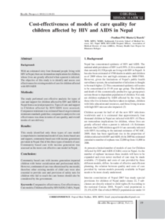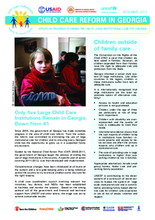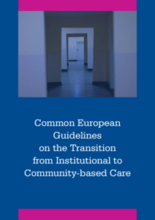Displaying 161 - 170 of 303
In this paper, the author argues that the response to the orphan crisis in sub-Saharan Africa has focused mainly on mobilizing and distributing material resources to households with orphans. Only a few anthropologists have interrogated the frameworks and values on which the projects for orphans are based. The paper provides an analysis of the trends in foster-care research in Africa and the author suggests that current ethnographic data on foster-care practices do not adequately reflect the changing context of fostering in that continent.
This manual is the main outcome of the European Commission Daphne III programme, Prevent and Combat Child Abuse: What works? Involving regional exchanges and research from five countries (Germany, Hungary, Portugal, Sweden and the Netherlands), this manual brings together knowledge on what works in tackling child abuse. The manual suggests evidence and practice-based prevention and response strategies against child abuse and neglect, including programs and services that have been shown to be successful in strengthening family care.
A report examining the experiences and attitudes of men involved in non-traditional care activities and roles in Brazil, Chile, India, Mexico, and South Africa.
This presentation to the 2012 Sofia Conference introduces social services available in Belarus for the identification, intervention, care, and rehabilitation of children under the age of 3 with disabilities, in order to prevent their abandonment and placement in institutions.
This presentation to the 2012 Sofia Conference by Darinka Yankova, Deputy Chairperson of the State Agency for Child Protection addresses the challenges and the new vision for the deinstitutionalization of children in the Republic of Bulgaria.
This presentation to the 2012 Sofia Conference by Valentina Buliga, Minister of Labor in Moldova, Social Protection and Family, introduces Moldova's ongoing collaboration between the Ministry of Health and the Ministry of Labor to reduce infant mortality and the placement of children under the age of 3 in institutions.
This research study aimed to identify and assess the cost effectiveness for existing models of care for children affected by HIV and AIDS in Nepal. The study performed a cost effective analysis for three types of care models in order to provide program managers and childcare professionals comparative economic evidence of the cost of caring for these children.
The document highlights the recent child care reform in Georgia under the partnership of the Ministry of Labor, Health, and Social Affairs of Georgia and UNICEF and provides an update on progress of ending the use of large institutions care for children.
The Common European Guidelines on the Transition from Institutional to Community-based Care (‘the Guidelines’) provide practical advice about how to make a sustained transition from institutional care to family-based and community-based alternatives for individuals (including children) currently living in institutions and those living in the community, often without adequate support.
This briefing paper seeks to address key misunderstandings about de-institutionalisation. It explains what it is and what it is not and addresses key questions often asked about the need for such institutions, the role they play and the impact of this transformation and what it entails.









